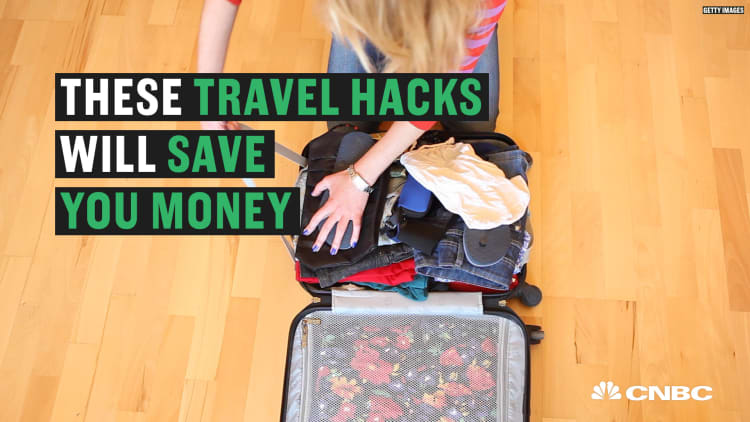Corporate travel managers have long had their hands full dealing with political unrest, terrorism and severe weather around the world. But now, they are contending with new complications — issues like security at border crossings and the legalities of data searches of electronic devices at airports.
They are holding conferences and seminars, like the Global Travel Risk Summit on Tuesday in New York, to discuss the new concerns about global travel.
"In the last six months, it's gone from a simmer to a boil," said Evan Konwiser, a vice president at American Express Global Business Travel, who moderated a session at a recent Association of Corporate Travel Executives conference in New York on how to support and protect business travelers.
What, he asked the group, are travel managers at companies doing to adapt their programs? "Are they doing it quickly enough? Smart enough?" he asked.
More from The New York Times:
Amazon will let customers try on clothes before buying
Too hot to fly? Climate change may take a toll on air travel
Move Over, Bitcoin. Ether Is the Digital Currency of the Moment.
One panelist, Julia Fidler, who manages travel for Microsoft, said, "We're definitely seeing more requests from travelers who ask, 'Tell me what to do; who do I go to to ask?'"
She added, "They still want to talk to somebody, know what number to dial, and if there will be somebody there to assist them."
A recent study by the association on how current geopolitical issues are affecting travel found that of the 239 corporate travel managers surveyed, 56 percent said they had seen an increase in reports of heightened personal safety concerns in late 2016 and early this year. And 54 percent said travelers had expressed new or growing concerns about how possible changes in visa requirements and immigration policies could affect travel to and from the United States.
"The pace of change is faster now than ever before and reaching to more regions not traditionally considered high risk," Greeley Koch, executive director at the Association of Corporate Travel Executives, said in an interview. "And we are starting to see the direct impact on the security and well-being of the traveler." His group worked with American Express Global Business Travel on the survey.
Mr. Koch said more companies were creating policies or strengthening existing ones to clarify what employees can and cannot do and to better assist them when travel disruptions occur. The survey indicated that 47 percent of companies had or planned to introduce training to address safety concerns in the next one to two years; 40 percent were discussing the option.
Stephen Barth, a lawyer and professor of hospitality law at the University of Houston, said difficulties often arose from incidents abroad because the legal responsibilities were not clear, even to experts. Workers' compensation laws in the United States do not always protect employees once they leave the country, unlike in Britain, where the Corporate Manslaughter Act "clarifies the responsibility of employers if an employee is put in harm's way," he said.
At a recent Global Travel Risk Summit in Chicago, a series of programs were aimed at helping organizations develop safe travel policies. In one, teams of travel managers played out dealing with hypothetical disruptions, like the right time to evacuate during a tsunami, the legal ramifications when an employee becomes paralyzed in a serious crash while using a shared car service or what to do if an employee is kidnapped.
Mr. Barth is the founder of HospitalityLawyer.com, which provides legal, safety and security resources for the industry and sponsored the meeting with the BTN Group, a business travel research firm. He said many travelers thought risks involved only extreme situations and did not realize that everyday occurrences could be just as deadly. After a traveler has flown all night with little or no sleep, having to drive on a different side of the street than in the home country "is very high risk," he said.
Many problems can be prevented or managed with minor precautions, like learning about a foreign country in advance and obtaining travel insurance coverage.
There has been a steady increase since 2012 in the number of Americans buying insurance for international trips, for emergency medical care, medical evacuation and repatriation in the case of a political event or act of God, according to the travel insurance comparison website Squaremouth. But many still do not realize the need, experts say.
"It's a misconception that credit cards will cover" most medical needs abroad, said Chris Carnicelli, chief executive of Generali Global Assistance. For many travelers, he added, buying supplemental coverage has "not been top of mind."
The industry trend, Mr. Carnicelli said, is to make policies easier to understand and provide coverage "more tailored toward individual travel needs." Identify theft protection, for example, is increasingly important in some countries.
Dale Buckner, president and chief executive of Global Guardian, a travel risk management company, said that to deal with cybersecurity effectively, "you have to create a defense in depth." Many organizations still allow employees to use Wi-Fi in hotels and other public places.

"Fake accounts are so widespread, it's an industry," he said. "The world has changed."
Nearly a third of travel managers in the corporate travel association survey reported increased concern about data privacy, but few corporations were addressing it with policies. Only 6 percent did not permit the use of public Wi-Fi with business devices.
"We have had to up our game," said Dennis J. Garritan, co-managing partner of the private equity firm Palmer Hill Capital. "The old rules proved insufficient."
He noted that travel to emerging markets was more important as business had become increasingly competitive. Widespread security issues also mean that clients need to be reassured, he said. Sometimes, using a secure line for phone conversations is enough, Mr. Garritan said, but personal trips are increasingly necessary.
He and colleagues have strategies to keep themselves — and their data — safe on high-risk business trips: no mobile phones, laptops or tablets (disposable phones are used for personal conversations); no charging of devices at airports or hotels; no use of open Wi-Fi, especially in China; required annual travel safety training; changing of all business and personal passwords after travel; wiping clean all borrowed or rented local devices used on trips and more robust travel insurance.
But even comprehensive policies have limits. "We have this delusion that anywhere in the world, emergency care is available when you need it," said Dr. Teri Reynolds, who oversees emergency, trauma and acute care for the World Health Organization. "It's a mistake. Many countries in many regions do not have basic emergency services available."
Even if a visitor is airlifted out, initial care is local and the first few hours are critical, Dr. Reynolds said. "Visitors are at the same risk as residents. No matter how good your insurance, you can't buy your way out."
But there are initiatives to upgrade services, like the move to create a universal emergency response telephone number. Currently, more than 100 numbers are in use worldwide, and about a third of the world's countries have no number, said Dr. Etienne Krug, director of the department for management of noncommunicable diseases, disability, violence and injury prevention at the W.H.O.
The W.H.O. is working to improve emergency care around the world. Much can be done with fewer resources, Dr. Krug said, "like better personnel training and simply equipped ambulances."
An often-overlooked resource, safety experts said, is the State Department, which maintains lists of insurance providers for overseas coverage and suggests actions that travelers can take during crises abroad. Its expanded use of social media enables quicker and greater outreach. The Smart Traveler Enrollment Program provides real-time alerts and safety information during emergencies like civil unrest or disease outbreaks, so the local United States Embassy can locate and assist citizens.
Dr. Garritan of Palmer Hill Capital said he and colleagues enrolled in the smart traveler program because they do not take GPS-enabled devices on high-risk business trips. "It is always reassuring," he said, for the State Department to "know where you are, when you will be there and when you're scheduled to come back."
Don't miss: If you want a raise, try taking a vacation


